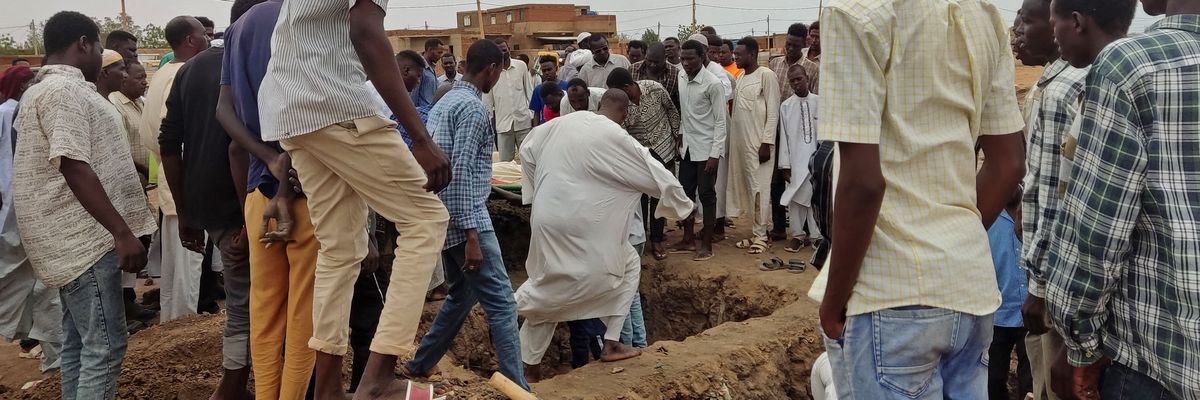Egypt announced Sunday that it plans to host a summit of Sudan's neighbors on July 13 to discuss how they might help broker an end to the 12-week battle between the Sudanese Armed Forces (SAF) and the paramilitary Rapid Support Forces (RSF)—an ongoing conflict that has exacerbated humanitarian crises in North Africa.
News of Thursday's meeting in Cairo came after United Nations Secretary-General António Guterres warned—in a Saturday statement issued by his deputy spokesperson Farhan Haq—that intensified fighting between the two factions "has pushed Sudan to the brink of a full-scale civil war, potentially destabilizing the entire region."
Since combat began on April 15 in the Sudanese capital of Khartoum, hundreds of people have been killed and nearly three million have been displaced, including almost 700,000 who have fled to neighboring countries, many of which are already grappling with extreme poverty and the impacts of local armed conflicts.
Speaking from a refugee camp in Adre, on the Sudan-Chad border, Al Jazeera correspondent Ahmed Idris noted Sunday that "cases of malnutrition are on the rise in camps in eastern Chad and other parts of Chad where Sudanese refugees have moved to."
Reutersreported Sunday that previous diplomatic efforts to halt fighting between SAF and RSF "have so far proved ineffective, with competing initiatives creating confusion over how the warring parties might be brought to negotiate."
As the news outlet explained:
Neither Egypt, seen as the Sudanese army's most important foreign ally, nor the United Arab Emirates, which has had close ties to the RSF, have played a prominent public role.
The two countries were also not involved in talks in Jeddah led by the United States and Saudi Arabia that adjourned last month after failing to secure a lasting ceasefire.
Sudan's two largest neighbors, Egypt and Ethiopia, have been at odds in recent years over the construction of a huge hydroelectric dam on Ethiopia's Blue Nile, close to the border with Sudan.
The upcoming summit in Cairo "aims to 'develop effective mechanisms' with neighboring states to settle the conflict peacefully, in coordination with other regional or international efforts," Reuters reported, citing a statement from Egyptian President Abdel Fattah El-Sisi.
The current fighting in Sudan erupted following weeks of tensions between SAF commander Abdel Fattah al-Burhan, chair of Sudan's Transitional Sovereign Council, and RSF commander Mohamed Hamdan Dagalo, or "Hemedti," the council's deputy chair.
The former allies joined forces to take control of Sudan in October 2021, two years after a 2019 military coup that occurred in the wake of a popular uprising to oust Omar al-Bashir, who had ruled Africa's third-largest country since leading the 1989 overthrow of a democratically elected government. However, during talks to establish a new transitional government, a dispute emerged over security force reform, turning al-Burhan and Dagalo—both of whom have long records of human rights abuses, including the brutal repression of pro-democracy activists—into rivals.
On Saturday, Guterres condemned a fresh air strike that killed at least 22 people in Omdurman, Sudan. After offering his condolences to the families of the victims and wishing a swift recovery to the dozens who were injured, the U.N. chief made clear that he is "appalled by reports of large-scale violence and casualties across Darfur" and "concerned about reports of renewed fighting in North Kordofan, South Kordofan, and Blue Nile States."
"There is an utter disregard for humanitarian and human rights law that is dangerous and disturbing," said Guterres' spokesperson. The U.N. chief reiterated his call for SAF and RSF "to cease fighting and commit to a durable cessation of hostilities." He also urged both sides "to abide by their obligations under international humanitarian and human rights law to protect civilians and to enable humanitarian action."
According to Reuters, "Sudanese delegations, including from civilian parties that shared power with the army and RSF after the overthrow of former President Omar al-Bashir four years ago, are expected to meet on Monday in the Ethiopian capital Addis Ababa for exploratory talks."

